- Home
- Rick R. Reed
Blue Umbrella Sky Page 2
Blue Umbrella Sky Read online
Page 2
Underneath the bed there was only a couple of inches of water, a pair of Keen sandals, and a metal storage box that contained Milt’s “toys”—and we’re not talking Fisher-Price here.
There was no Ruby. Nor any other living creature.
Milt got to his feet, groaning, and took stock of the entire bedroom, thinking perhaps Ruby had retreated to a corner or hidden behind the chest of drawers. But she was nowhere to be found, not even in the adjacent bathroom, which looked now as though Milt had taken a long, long shower and had simply not bothered to turn the water off.
Knowing she wouldn’t be there, but checking anyway, Milt opened the frosted glass shower door to find it empty.
He made a tour of the trailer, getting more and more anxious with each step, with each empty nook and cranny. “Ruby?” he called out several times, each time his voice growing louder, as though sheer volume would make her appear.
But she didn’t.
And the thoughtlessly left-open back door gave testimony to what had most likely happened. The poor terrified girl had probably tried to escape that way, running headlong into a fate worse than she was trying to escape. Milt hurried to the open door, peering out onto his little patio, hoping against hope she’d be out there, stub of a tail sending up splashes as she looked mournfully at him.
But Ruby was gone.
Milt felt as though his heart would break.
He closed the door behind him, sighing and wondering if he should leave it open, just in case she tried to return. Return to what? A trailer flooded with filthy—and probably bacteria-ridden—water?
He moved back to the sliders, looking over Billy’s broad shoulders, hoping Ruby would appear on the doused desert landscape.
Billy smiled at Milt’s return. “Dog?” he wondered.
Milt’s breath caught. The day, or not really the day but only, really, the past few minutes, had been a disaster. Disasters happen fast and savage in Palm Springs. He wasn’t sure he could speak without bursting into tears, without chastising himself for his own carelessness.
If only I hadn’t left that damn door open.
“She’s nowhere to be found.” Milt shrugged.
Billy frowned, and his gaze seemed to reach out to Milt in sympathy, which made Milt want to cry even more. “She’ll turn up.” Billy changed his expression to a reassuring smile. “She’s got it good—a man all to herself, and I assume a limitless supply of treats.” He winked. “I wish I could say the same.”
Ah, so he’s one of us. I thought so, but one doesn’t want to assume. “I’m sure you’re right,” Milt said, although he wasn’t sure at all.
“You still want to come over? I got carnitas cooking in the Crock-Pot. Homemade tortillas. I may be blond, but I cook like the locals.”
Milt managed a smile. The thought of food made his stomach turn, thinking of Ruby running around out there somewhere—with threats like coyotes, black widow spiders, and rattlesnakes all around, just to name a few. She might look fierce, but Milt feared she wouldn’t last long up against the desert’s more formidable predators.
At least it’s not raining anymore.
“You wanna gather some stuff up?”
Milt shook his head. “It’ll be okay.” Barefoot, morose, he stepped through the sliders and outside.
“Atta boy. We’ll get settled over at my place, and then we can do a little search-and-rescue mission. I’m sure she’s not far away.”
“I hope not.” Milt followed Billy Blue into the unseasonably damp day. Steam was already beginning to rise off surfaces not under water.
The sun was beginning to come out again, revealing blue skies.
Milt couldn’t see it, though.
Chapter 2
“I DON’T know what I’m going to do,” Milt said in response to his best friend, Dane Bernard’s, question. Tugging at his black necktie, he longed for some air, some clarity. An escape. Yes, he just wanted to be away…
… from this nightmare
… from this death
… from this reality, a reality that revealed a dark future, one that seemed, right now, to be devoid of hope.
Where was the life Milt had planned? You know, the one that included growing old with Corky, that clichéd notion of being in rocking chairs, side by side, fingers intertwined.
“You don’t have to decide right now. You have plenty of time. And nothing, really, has to change. You have a wonderful community here—a great network of friends who love you dearly. Students who look up to you.” Dane, a big man, Milt’s best friend and coteacher at Summitville High School, had experienced his own loss of a spouse a few years ago when his wife, Katie, had perished in a car accident out on Route 11. Dane squeezed Seth’s hand and then let go. “And of course, you can always count on Seth and me to be there whenever you need us.” He grinned a little. “And even when you don’t, to the point where we become irritants.” He shrugged. “Give yourself time. You’ll know what to do when the time is right.”
“Said by a person for whom everything changed when their life partner passed.” Milt raised an eyebrow. He sat across a folding card table from Dane at the American Legion hall, which Milt had rented for the after-funeral lunch. There’d been a buffet of rigatoni in meat sauce, fried chicken, and tossed salad. A Texas sheet cake waited on a table for someone to be the first to cut into it. There was punch and, for the drinkers, beer and horrible red wine in boxes.
Dane nodded. After his wife died, Dane had come out, to the school’s and the town’s shock. He was now married to yet another teacher at the high school, Seth Wolcott. The three men were, far as Milt knew, the only gays at the school, at least on the teaching end. He had suspicions about Betty Beaver, who ran the school cafeteria.
Milt, Dane, and Seth were best friends—not because they had the unusual distinction of being the only gays in the village, so to speak, but because each was possessed of a singularly large organ.
Their hearts.
“I have no regrets about being married to Katie. You know that.”
“You got the kids.” Milt nodded, as if that rationalization was obvious. Dane had a teenage son and daughter. Both were smart, well-adjusted, and turning out to be gorgeous—both inside and out.
“Yeah, that’s true. I got the kids, but that’s not the only reason.” Dane chuckled. “That’s the reason most people think, now that they know—and I know—I’m gay, but I really loved her, Milt. In my own way, as much as I love Seth. I miss her every day.” Dane studied Milt, and Milt could see Dane’s eyes growing shinier, which caused sympathetic tears to well up within Milt’s own eyes. He was feeling extremely vulnerable these days.
“I’m gonna miss Corky every day. I can’t imagine a world without him in it.” Milt shrugged. “Hell, I already miss him.” He sniffed. “Actually, I’d been pining away for him since long before he passed. He was gone….” Milt’s voice trailed off, and he shook his head, breath fluttering. He gripped the table, all the air in the room suddenly sucked out of it.
Finally Milt got control of his tears and continued. “He was actually gone that summer day, a couple of years ago, when he told me he couldn’t find his sunglasses.” Milt wanted to weep at the memory and wished he were alone instead of in an American Legion hall full of sympathetic and sad faces. Instead of crying, though, Milt dug down deep and summoned a chuckle. “How we laughed about it that day, because they were right on top of his big old bald head!” Milt laughed some more but then quickly grew serious. “But this was the second time we’d laughed about it. We cracked up about it again because it had only been about ten minutes before that we’d laughed over it when he’d confronted me with the very same problem.” He looked pointedly at Dane. “I always remember that moment, silly as it might sound. But that’s when I started to get scared that something was wrong. His mom and his aunt, her sister, had both passed from Alzheimer’s. He was always worried about it coming to him. Who knew it would rush right up to him, and him so young?” Milt looked
away at the people in the hall, with its knotty pine paneling, American flags, its black-and-white checked tile floor where, once upon a time, he and Corky had had the courage to slow dance in front of his coworkers at a Christmas party. That was a moment he’d never forget either—proudly holding his big, strong bearded man in his arms as they waltzed around the floor to Al Green’s “Let’s Stay Together.” Milt recalled the line about wanting to spend a life with that special person. He didn’t know, that Christmas just four or five years ago, how short their life together was destined to be.
Milt stared down at his paper plate. He picked up a chicken leg and took a bite. The meat tasted like paper or Styrofoam—like nothing. He chewed slowly, though, telling himself he had to hold it together for just an hour or two more. Then he could go home—to their little redbrick ranch overlooking the Ohio River—and break down. He could stare at the muddy water as it curved, serpentine, through their town and watch the snowflakes melt as they landed on its surface. He could imagine warmer, happier times when he and Corky would wend their way down the banks on what they thought of as their secret trail to skinny-dip on hot summer afternoons from the pebbled shore.
He’d savor these memories alone.
When he looked up again, he forced himself to smile. And Dane, the relief apparent on his face, smiled back. He squeezed Milt’s hand. “As I said, you don’t need to make any decisions now. Everything can wait. Don’t rush yourself. This is a vulnerable time. You’re in no condition to make big choices.” Dane reached over to pat Milt’s hand. “Nothing has to change.”
But everything has changed, Milt thought. Everything.
Dane’s words felt like a weight pressing against Milt’s chest, sucking away his air. No. Everything couldn’t wait.
Things had been waiting, waiting, waiting for the past two years as Corky deteriorated. The forgetfulness was a joke at first, then more and more terrifying as the disease cruelly progressed. And then came the personality changes and watching his big kind bear of a husband become mean. That was something Milt hadn’t been prepared for. His big lovable bear was the type to trap a spider and release it outdoors rather than kill it. And yet, at his worst, Corky had punched and slapped Milt more times than Milt had ever let anyone know, hiding his bruises when he could and, when he couldn’t, concocting stories to explain them innocently away. But he knew Corky hadn’t been himself. And then, faster and faster, everything went to shit, with Corky no longer knowing who Milt was—and that hurt far worse than any fist to the jaw—and then his constant, and sometimes successful, attempts to escape their home. Dressed or not.
Putting him in a home broke Milt’s heart. But he just couldn’t handle things alone anymore. The move to the home, he told himself, was for Corky’s own safety. And it was. It really was. But it was also for Milt’s sanity. Still, it just about killed him to see Corky there, in that antiseptic place with the wheelchair-bound, the bright, artificial Muzak, the smell of Lysol barely masking the odors of shit and piss.
Fortunately—or not—that almost-final letting go and putting him in care was for only a very short time. Once there, Corky quickly declined—and moved on for good.
In only two weeks.
“No, man, nothing can wait. My life has been on hold for so long, I feel like I can’t fuckin’ breathe. I need a change.” Milt gazed desperately about the room, feeling trapped here. This luncheon wasn’t a comfort, despite the home-cooked food, the kind faces, and the consoling words. It was a reminder that he still existed in a cage.
Dane cocked his head. “You’re not gonna leave us, are you?” There was real despair on Dane’s face, and Milt almost swept in with false reassurance, words he knew Dane expected to hear. Milt had always been the kind of guy who thought of others first—not that there was anything wrong with that, except when you did it at the expense of yourself.
Milt finally realized, in his early forties but not too late, that he needed to secure his own oxygen mask first before he would be any good to anyone else.
“You don’t want me to go?”
“Of course I don’t! You’re my best friend, Milt. Who would Seth and I go to lunch and a movie at the Boardman Mall with? Who would help us run the popcorn stand at football games in the fall?” Dane laughed. “And who will cook us that damn chili you’re always saying is the best in the world?” Dane, still smiling, wiped a tear out of the corner of his eye. “Don’t tell Seth I said it, but it really is. The best in the world.” Dane stared at him, hard. “Really, man, we’d be lost without you.”
Milt didn’t know what to say to that. Well, he knew what to say, but he felt like he’d be heartless and cruel if he said it.
After a few moments, though, Dane saved him. “I’m so sorry, buddy. I’m being a selfish dick. I shouldn’t make you feel bad. What a shit I am! What—what are you thinking of doing? Um, now that things are different?”
Milt looked for a minute out the big plate glass window at the front of the Legion hall, where snowflakes were beginning to fall. Pretty, big, and fluffy, but they’d make everyone’s drive home on the windy, hilly roads of Summitville treacherous. They told a tale of biting wind, cold that froze the tip of your nose, cold that hurt.
“Palm Springs has three hundred and fifty days of sunshine a year,” Milt blurted out.
Dane followed Milt’s gaze to the window—the snow falling fast, the edges of the glass etched with frost. “Sounds wonderful.” He ate a few bites of pasta, then said, “Wait. You’re thinking of moving out there? To Southern California?”
Truth be told, Milt hadn’t seriously considered it until right this very moment. In the last months of Corky’s decline, when autumn was morphing into winter, with its sleety gray skies and bare, leafless trees, he’d imagined, in a vague way, a place that was sunny and always warm. Maybe oceanfront on the Gulf coast of Florida. Naples was nice. Or maybe he could become an expat and get himself down to Mexico and the Yucatán peninsula. He and Corky had had one of their best vacations ever there, renting a beach house in the little village of Puerto Morelos. All they did was lie by the pool, drink margaritas, make love, walk hand in hand on the beach, and read a book a day. Heaven.
In the lobby of the nursing home, just before Corky passed, Milt had picked up an old issue of Travel and Leisure magazine, drawn by its cover—a field of Joshua trees with a range of rusty mountains, rocky and austere, rising up majestically behind them to meet the electric blue sky. Milt thought the trees looked like something out of Dr. Seuss. The magazine had contained a story about Palm Springs and the desert—the beauty of the area and the abundant sunshine, its spiritual presence. There were dazzling photos of sun-drenched mountain ranges, cacti, vibrant desert blooms, and blue skies, nothing but blue skies….
He’d set the magazine down when an aide came to tell him Corky was awake and would he like to see him?
He hadn’t thought anything more of Palm Springs until this very moment. But the thought had stayed with him, tucked away in his subconscious until today, when he realized, in his grief, that despite being devastated by a crushing loss, he was also free.
And now, seeing that article seemed very much like fate.
“Yeah,” he said, his voice becoming more confident and convinced as he went on. “Yeah, I am. If I can make the finances work, I just might move out to Palm Springs.” Another notion seized him. “Maybe take an extended sabbatical and write that novel I’ve always considered doing.”
A vision rose up in Milt’s mind’s eye—a dusty, rock-strewn trail, the earth beneath his feet sun-washed, ochre, heading upward, the side of a blue-gray mountain. A relentless sun beat down, making each step both effort and joy, making his heart pound in his chest, reminding him he was alive.
His vision stopped when Dane’s husband, Seth, with his curly-haired handsomeness and winsome smile, interrupted. He sat down at the table with a paper plate loaded with chicken breasts and pasta, and Milt hated him for just a moment—to be able to eat like that and maintain wh
at was obviously a thirty-inch waist.
He smiled at Milt and gave Dane a little wink. “What are you two talking about?”
Dane spoke before Milt had the chance. “Milt here is moving to Palm Springs.”
Seth laughed. “What?”
They were quiet for a moment, and Milt was certain that Seth thought his husband was kidding around. Nothing much ever changed in Summitville. And teachers certainly didn’t leave Summitville High midterm to hightail it off to Southern California.
When no one picked up the conversational thread, Seth wiped his mouth with a paper napkin and caught Milt’s eye. “He’s fucking with me, right?”
And for just a moment, the idea did seem absurd, a flight of fancy, something one would think of in the midst of emotional trauma, but with the passage of time would come to seem like a silly notion.
Maybe when it was time to retire he could move out there, get himself a little casita with a pool.
Milt shook his head. No. The idea wasn’t the passing notion of a bereaved man. It had force. And even though Milt had yet to work out the logistics of what he knew everyone would view as a rash move, he felt deep in his gut: I’m gonna do this.
Milt blew out a big sigh. “If he’s fucking with you, brother, I don’t need to see it. If he’s pulling your leg, depending on the circumstances, I might not need to see that either. But if you think your big, strapping hubby is having you on—joking with you—well, I’m afraid that’s not the case.” Milt looked down at the checked floor for a second, noticing the imprint of a muddy shoe, and then back up at Seth. “I’m moving to Palm Springs.”

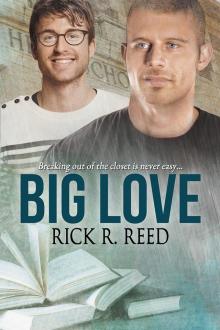 Big Love
Big Love Blue Umbrella Sky
Blue Umbrella Sky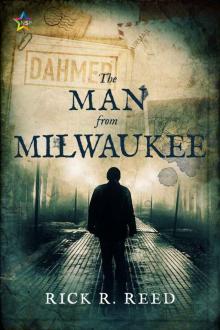 The Man From Milwaukee
The Man From Milwaukee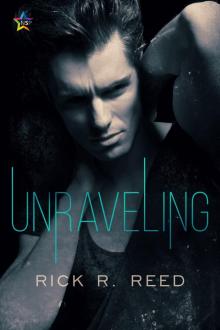 Unraveling
Unraveling Penance
Penance Husband Hunters
Husband Hunters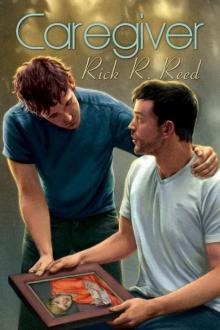 Caregiver
Caregiver Superstar
Superstar Beau and the Beast
Beau and the Beast Obsessed
Obsessed Bigger Love
Bigger Love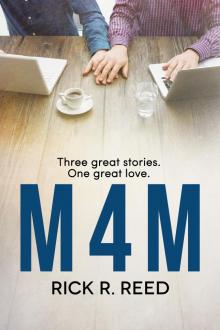 M4M
M4M I Heart Boston Terriers
I Heart Boston Terriers Dinner at Jack's
Dinner at Jack's A Dangerous Game
A Dangerous Game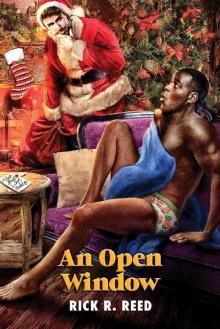 An Open Window
An Open Window Dinner at Fiorello’s
Dinner at Fiorello’s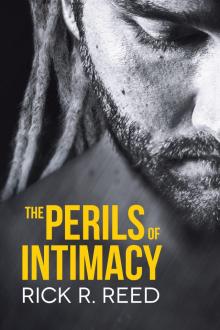 The Perils of Intimacy
The Perils of Intimacy Orientation
Orientation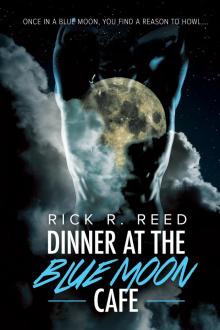 Dinner at the Blue Moon Cafe
Dinner at the Blue Moon Cafe High Risk
High Risk Sky Full of Mysteries
Sky Full of Mysteries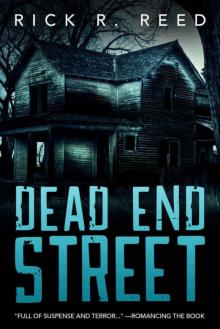 Dead End Street
Dead End Street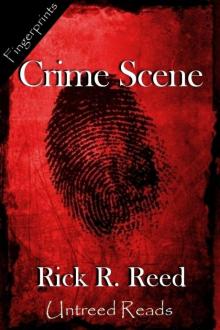 Crime Scene
Crime Scene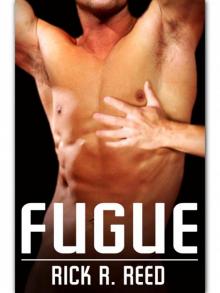 Fugue
Fugue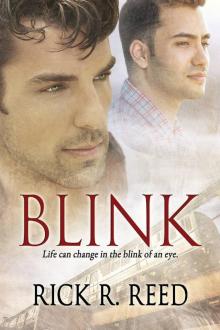 Blink
Blink Lost and Found
Lost and Found